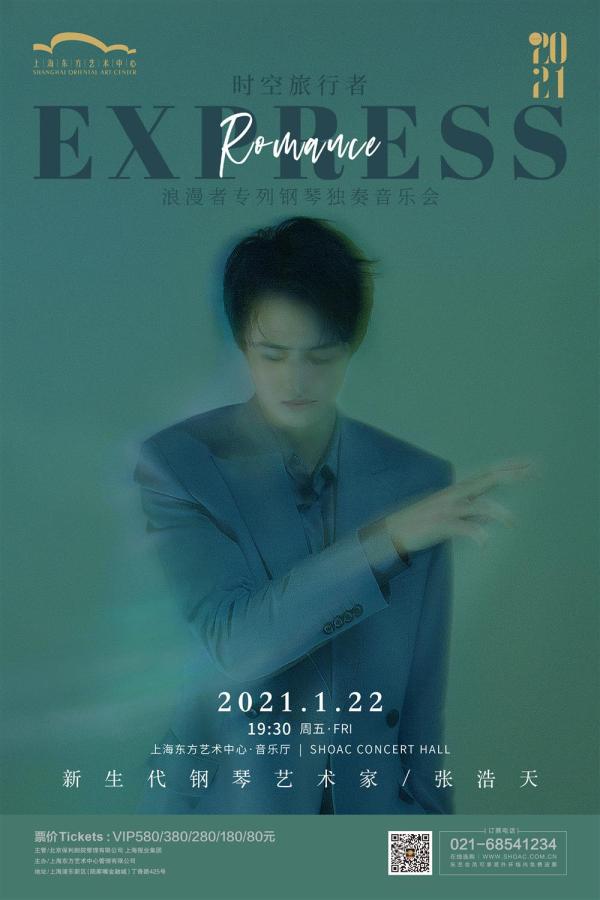Invited by the Antarctic Forum and the China Symphony Foundation, in late 2019, pianist Zhang Haotian, born in 1993, traveled to Antarctica to give a special performance for the expedition staff. Passing through Buenos Aires, Argentina, he was touched by the exoticism and local cultural history. "This experience gave me the idea of traveling through time and space to share music, art, and life with everyone." After returning to China, with the theme of "Time and Space Traveler", Zhang Haotian planned a mysterious journey from classical music to romance, impression to modern times, and finally back to contemporary times.

On January 22, Zhang Haotian's "Time Traveler's Romantic Train" concert will land at the Oriental Art Center. In 2021, coinciding with the 100th anniversary of the birth of "Tango Father" Piazzola and the 210th anniversary of the birth of "King of the Piano" Liszt, Dongyi specially planned a series of performances, inviting the new generation of pianist Zuo Zhang and violinist Lu Siqing to pay tribute to the two masters with various art forms, and dongyi's veteran project "Oriental Citizens Concert" specially planned theme concerts for this purpose. Among them, Zhang Haotian will start the first cannon and officially open the series of performances with classic tango dance music and Liszt's "most difficult piano works".
2021 marks the 100th anniversary of the birth of The "Father of Tango" Argentine composer Astul Piazola. Some people say that the appearance of Piazzolla has an extraordinary significance, without Which there would be no "tango music" today. Based on a comprehensive and systematic classical music technique, he creatively blended the composition styles of traditional classical music and jazz, elevating tango music from popular dance accompaniment music to a highly artistic pure musical form that can be displayed on stage alone, with both classical "shapes" and tango "gods".
On the journey to Antarctica, Zhang Haotian stayed in Argentina for two days, went to the largest local library, and "as soon as I entered, I saw a copy of Piazzolla's Four Seasons of Buenos Aires, and behind the score was the collection of works of Piazola's teacher, Alberto Sinatra. Zhang Haotian already liked Xenastra's work, and the "encounter" in Argentina made him feel that it seemed to be a guide of fate. To this end, he chose Piazzolla's "Four Seasons of Buenos Aires" as the "departure station" of the "time travel train". This work was created by Piazzolla in homage to Vivaldi's Four Seasons, with four movements of spring, summer, autumn and winter corresponding to four seasons, showing a completely different musical mood.
Two of Piazzolla's other tango works, Oblivion and Freedom Of The Tango, will also be presented in concerts, bringing together classical and jazz musical elements, making the music modern and mysterious while taking on the national character of Argentina itself. Piazzolla wrote very few pieces specifically for the piano, most of them were string works, and Zhang Haotian deliberately sought out a suitable piano score to play in concert. The work of Piazola's teacher, Alberto Sinastra, naturally could not be absent. Sinastra combines traditional and modern creative techniques to create a typical Argentine national color, and what kind of listening experience will be brought by the concert scene of "Argentine Dance" and "Piano Sonata No. 1", which is expected.
In the repertoire of the tour, Liszt's piano piece "Don Juan" based on Mozart's opera "Don Juan" was also specially selected by Zhang Haotian. The opera Don Juan, which lasted about two and a half hours, was adapted by Liszt and became a short piano piece, the essence of Liszt's many adaptations. This work requires a very short period of time to quickly cross the keyboard with both hands, and its technical difficulty and grandeur make it known as "one of the most difficult piano pieces in the world".
Zhang Haotian liked Liszt's innovations. In his view, the works created by liszt, Beethoven and other masters in their time were the most popular at that time, "We are now called classical music, but because it has been passed down through a long time, it has become a classic." In this era, we must not forget the attempts at cross-border and innovation. Based on this musical understanding, he hopes to have an experimental spirit and a sense of innovation, and to do something "different."
At the age of 5, he received piano enlightenment, at the age of 12, he won the first prize in the Canadian National Music Competition, at the age of 15, he was admitted to the Mannis Conservatory of Music in the United States with the first place in the year, and at the age of 20, he was admitted to the Graduate School of the Royal Conservatory of Music, and Zhang Haotian's music resume was quite dazzling. He is happy to participate in cross-border activities, and the young pianist can be seen on many fashion occasions. At the beginning of 2020, as one of the performers of the "National Treasure Concert", Zhang Haotian appeared on the stage of CCTV's "National Treasure". Prior to that, he had also collaborated with idol boy band R1SE on the group's debut EP eponymous title track.
"The field of classical music can explore many interesting things, actively explore the field of their own contact, and hope to attract more people to like classical music and enter the concert hall." Zhang Haotian said that for cross-border and innovation, his "bottom line" is the music itself, "no matter what type of music, it must be good, I can listen to it myself, I will try." ”
Column Editor-in-Chief: Li Junna Text Editor: Li Junna Photo Editor: Shao Jing
Source: Author: Shi Chenlu